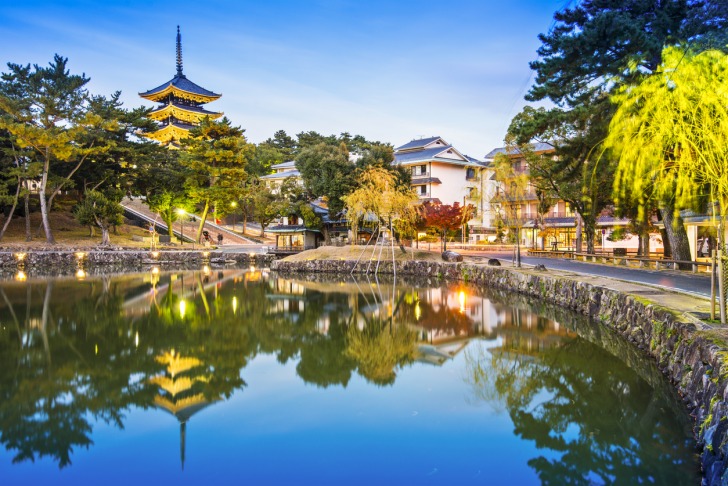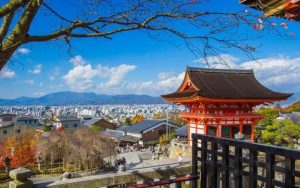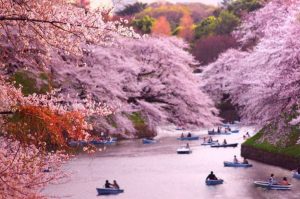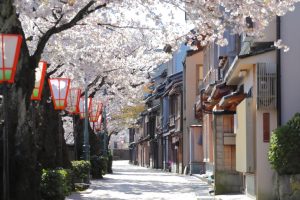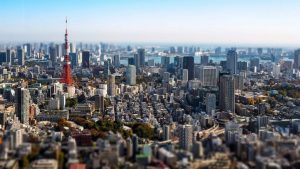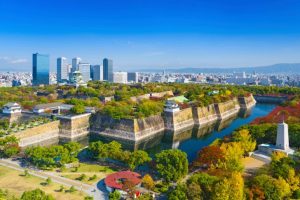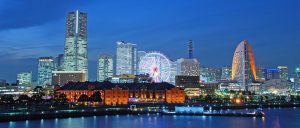 Japan : Safety by City
Japan : Safety by City
Japan - safety as a country Many of us dream of visiting Japan and its unique traditional cities.
While Tokyo is the most popular destination, others will want to explore other areas of Japan.
One of the places close to popular tourist cities Kyoto and Osaka, located in the Kansai Region, is Nara.
Nara is a destination no one will want to miss, as it hosts some of the world’s oldest shrines, temples, and even palaces.
Despite its traditional heritage, Nara has breathtaking mountain trails and three World Heritage sites.
Not into nature or historical structures?
Don’t worry.
Nara is also home to many natural hot springs and includes a handful of regional signature dishes.
However, before booking a flight, you’ll want to know that you’re safe in Nara, Japan.
Warnings & Dangers in Nara

OVERALL RISK: LOW
Nara is considered one of the safest places, even at night. The crime rate is reported as low, but it's still best to be aware of your surroundings. The biggest crime rate in Nara is theft, but it's relatively low compared to other places worldwide.

TRANSPORT & TAXIS RISK: LOW
Nara also has reliable taxi and transport services, from public transport to Uber drivers. While safety isn't a concern, major taxi services in Japan will only service those who have a Japanese phone number or who can speak fluently. So, the language barrier will be your biggest concern.

PICKPOCKETS RISK: LOW
There is a relatively low risk of getting pickpocketed in Nara. Funnily enough, a review says that the most likely pickpockets will be the deer roaming about who will want to eat your map. The only areas you should be wary of are tourist destinations.

NATURAL DISASTERS RISK: MEDIUM
Japan is known for being one of the worst places for earthquakes. Out of the past 50 years, Nara has experienced nearly 13 earthquakes of eight or higher magnitude. For those not familiar with earthquakes, this can be disconcerting. After an earthquake, there is also the risk of a tsunami, but it's rare for Nara to experience one.

MUGGING RISK: LOW
Japan has relatively low crime rates, and mugging is no different. There is little risk when walking around Nara, Japan, even at night. Those who visited said they had little to no worries about getting mugged or robbed.

TERRORISM RISK: LOW
Terrorism used to be a large threat to Japan and its people. However, since 1995, there has been little to no risk of a terrorist threat happening. This is largely due to the efforts of the Ministry of Foreign Affairs Japan (MOFA) and police to reduce risks.

SCAMS RISK: MEDIUM
Nara is home to many historical places that draw tourists. Scam artists often target tourists due to their lack of knowledge of Japan. These can range from scam donations to religious fundraisers and more. Luckily, many of these scams can be easily avoided by declining to pay when someone asks for money.

WOMEN TRAVELERS RISK: LOW
Japan, especially Nara, is safe for solo female travelers. Many who have visited have stated they've felt safe walking alone, even at night. Of course, you should still be aware of your surroundings and mindful of who is around.

TAP WATER RISK: LOW
Japan has relatively good tap water in most major cities. In rare cases, a host may request that you don't drink the tap water. However, this is a rare occurrence and is generally due to the house's old building. If you're staying at a hotel or Airbnb, you'll be fine drinking the tap.
Safest Places to Visit in Nara
Many of Nara’s safest places are public tourist destinations.
Here, many people are focused on enjoying the surrounding scenery and less focused on doing anything suspicious.
There are multiple safe destinations in Nara, ranging from temples to gardens and even parks full of wildlife.
The two most recommended temples are the Todaiji Temple and Horyuji.
People also recommend stopping by Isuien Garden, Nara Park, and Yoshikien Garden.
Lastly, visiting Nara’s Iga Ueno castle town is also safe yet interesting, as you can learn about ninjas.
Places to Avoid in Nara
Nara Deer Park is the only place we’ve seen that isn’t recommended.
While many people suggest visiting, the problem is that many tourists get injured due to the wildlife.
The deer are noticeably touchy and often go after anything hanging off of a person or an object that piques their interest.
Since the deer are very active, people are often unprepared for their sudden behavior.
Some deer sprint into traffic, while others become defensive or angry around visitors.
It’s best to respect the rules of Nara Park and not feed the deer.
Better yet, don’t bring any food, and respect the wildlife by giving them space.
Safety Tips for Traveling to Nara
- Get an IC Card – An IC card is an integrated smart card (IC) that allows visitors to pay for major transportation fares. Using the heavily monitored public transportation system, an IC card can help you avoid any risks.
- Keep Track of Your Cash – Japan mainly uses cash for most of its transactions, aside from transportation payment cards. However, a few scam artists will try to swap out larger bills for smaller ones. Keep an eye on your cash, and don’t hand anything except exact change to someone.
- Familiarize Yourself With Disaster Warnings – Since Japan has many natural disasters, it’s best to familiarize yourself with the warning alarms. The country has set up many safeguards to help warn citizens if there is imminent danger. This includes broadcasting earthquake early warnings, tsunami warnings, weather warnings, and even volcanic warnings.
- Learning the Language – Learning to speak Japanese can help keep you safe from a dangerous situation. While many people in Japan speak some English, others won’t. Navigating safely and communicating with locals can help if you get into a tough situation.
- Be Punctual – This may seem like a weird tip, but Japan is a very punctual country, and being late can result in you missing your event or transportation. Unlike other places, Japan will start an event at exactly the time they advertise. So, it’s best to always allow yourself extra time.
- Download Helpful Apps – If you’re a visitor, you want to download some important apps. These can include the Japan Transit Planner, Japan Travel—Route, Map, Guide, and Google Maps. Also, download the Safety Tips app, VoiceTra, and Travel JAPAN Wi-Fi.
- Know Travel Limitations – Another aspect to remember is knowing when your visa is up. You must also complete the appropriate documentation if you’re in Japan for business. Not adhering to these laws can get you in trouble.
- Use Common Sense – While Japan is known as one of the safest in the world, there is always a chance that something could go wrong. Use common sense and be aware of your surroundings.
- Avoid Suspicious Areas – If you’re traveling and something looks unsafe, don’t go there. Japan, especially Nara, is often safe, but there are still risks if you’re traveling alone and are in a shady area.
- Be Cautious During Nightlife – bars, clubs, and other establishments are places where crime is higher. You’ll want to pay specific attention to how much you drink, who served your drink, etc.
So... How Safe Is Nara Really?
Nara is known to be one of the safer towns if you’re traveling in Japan.
It has a generally low crime rate, even for smaller crimes like pickpocketing.
Many people feel safe walking around Nara day or night, which is a plus.
Travelers have also stated that there is reliable transportation, the streets are well-lit, and the locals are often friendly.
Many have noted Nara’s deer community as the only safety hazard.
Nara is home to a lot of wildlife, particularly free-roaming deer.
When interacting with them, just be respectful and mindful of their behavior.
If they seem irritated, then leave them alone.
Otherwise, you could provoke a deer, and it could become aggressive.
Looking at Nara’s crime statistics, we can also see that there are low rates of a vast majority of crimes.
This includes drug related crimes, property theft, violence, and more.
The biggest crime in Nara seems to be corruption and bribery and theft.
However, these numbers are still very low when compared to other cities.
Women solo travelers have also reported that they feel safe in Nara, even at night.
This is a great sign, as it helps you understand the atmosphere of the town.
Unlike other places, such as Tokyo, Nara is very peaceful in comparison.
So, if you’re a female alone in Nara, you shouldn’t worry but stay mindful of your surroundings.
In summary, Nara, Japan, is generally safe and travelers have little to worry when walking in the town.
The Nara police are also very responsive and can help assist in case of an emergency.
So, if you’re debating about traveling to Nara, Japan, then you can rest assured that the trip will be safe.
Just be sure to keep your personal belongings safe and be mindful of your surroundings.
How Does Nara Compare?
| City | Safety Index |
|---|---|
| Nara | 88 |
| Kyoto | 83 |
| Tokyo | 80 |
| Osaka | 79 |
| Hiroshima | 68 |
| Nagasaki | 96 |
| Sapporo | 92 |
| Phnom Penh (Cambodia) | 61 |
| Niagara Falls (Canada) | 87 |
| Calgary (Canada) | 82 |
| Buenos Aires (Argentina) | 60 |
| Vancouver (Canada) | 82 |
| Cordoba (Argentina) | 61 |
Useful Information

Visas
Are vital when traveling to Japan, and you'll want to head to the Ministry of Foreign Affairs of Japan to inquire about which type. If you plan to head to Japan for work, you'll need to submit additional documentation and get approval. There are many types of visas in Japan, including 30 work visas, long-term stay, start-up, freelancer, and more.

Currency
Japan uses the yen, which is required when traveling. Many Japanese establishments are switching to accepting debit and credit cards. However, not every business does this. If you're traveling, it's always recommended to communicate how you can pay before getting a service. ATMs spread across Japan allow you to withdraw money, but Nara doesn't have many. Travelers generally can find ATMs even at the airport, which allows them to access yen. However, if you're not near any one of these, then you can pay for a prepaid card and use that as your form of payment. That being said, Nara, Japan, usually handles business with cash only. So be prepared if you visit.

Weather
Varies greatly depending on the time of the year you come and ranges from 38 degrees Fahrenheit to 81 degrees Fahrenheit. Summer months are generally on the warmer side, with a subtropical climate. On the other hand, winters are colder, with an average annual snowfall of 142 cm of snow per year. Nara, Japan also has a rainy season from mid-June to late July. If you're traveling during these times, you will need to dress accordingly.

Airports
The closest airports are Osaka International (Itami) Airport and Kansai International Airport. To get to Nara, Japan, you will need to fly to one of these airports and then take a train ride to Nara. The ride takes around an hour to an hour and a half.

Travel Insurance
Travel insurance isn't mandatory but is often recommended to visitors. The price of travel insurance varies depending on several factors, such as age, length of stay, policy, etc. In general, plan to allocate at least 5-10% of your budget to travel insurance.
Nara Weather Averages (Temperatures)
Average High/Low Temperature
| Temperature / Month | Jan | Feb | Mar | Apr | May | Jun | Jul | Aug | Sep | Oct | Nov | Dec |
|---|---|---|---|---|---|---|---|---|---|---|---|---|
| High °C | 9 | 10 | 13 | 20 | 24 | 27 | 31 | 33 | 28 | 22 | 16 | 11 |
| Low °C | -1 | -1 | 1 | 7 | 12 | 17 | 22 | 22 | 18 | 11 | 6 | 1 |
| High °F | 48 | 50 | 55 | 68 | 75 | 81 | 88 | 91 | 82 | 72 | 61 | 52 |
| Low °F | 30 | 30 | 34 | 45 | 54 | 63 | 72 | 72 | 64 | 52 | 43 | 34 |
Japan - Safety by City
| City | Safety Index |
|---|---|
| Hiroshima | 68 |
| Kanazawa | 83 |
| Kyoto | 83 |
| Nagasaki | 96 |
| Nara | 88 |
| Osaka | 79 |
| Sapporo | 92 |
| Sendai | 88 |
| Tokyo | 80 |
| Yokohama | 87 |
